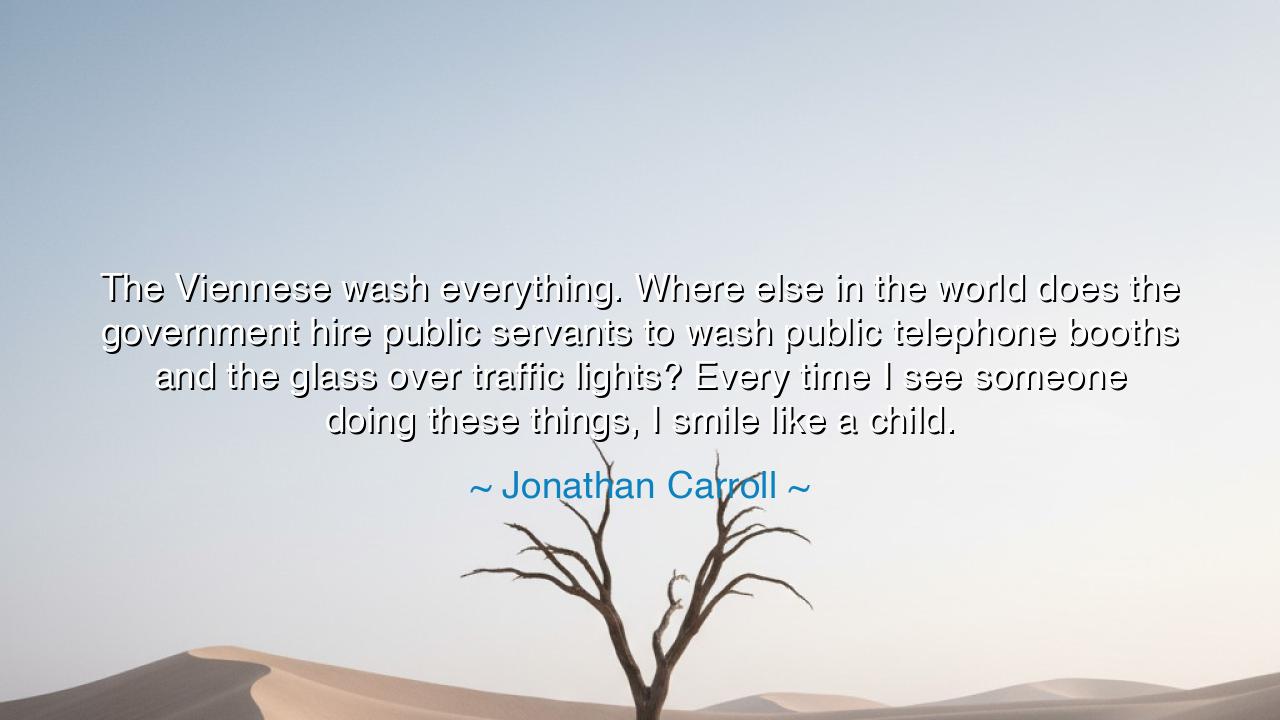
The Viennese wash everything. Where else in the world does the
The Viennese wash everything. Where else in the world does the government hire public servants to wash public telephone booths and the glass over traffic lights? Every time I see someone doing these things, I smile like a child.






The words of Jonathan Carroll, “The Viennese wash everything. Where else in the world does the government hire public servants to wash public telephone booths and the glass over traffic lights? Every time I see someone doing these things, I smile like a child,” hold within them a wisdom that transcends the simple image of cleaning. For in this act of washing, in the quiet care of maintaining what others would overlook, there is revealed a devotion to order, to beauty, and to the dignity of daily life. His smile like a child is not only delight in the act itself, but a recognition of a world that values small details, where even glass and steel are treated with reverence.
The ancients often spoke of purity—not only of the body, but of the city, the home, and the spirit. To wash was never just to remove dirt, but to restore harmony between humanity and its surroundings. When Carroll marvels at the sight of telephone booths and traffic lights being washed, he is in awe of a society that remembers this truth: that beauty and cleanliness nourish the human soul. The childlike smile arises because such acts awaken in us a forgotten joy, the wonder that even ordinary things can be made sacred when cared for.
Consider the example of the Japanese tradition of osoji, the great cleaning performed at the end of each year. Families and even public institutions join in sweeping, scrubbing, and restoring their spaces. To the outsider, it may appear excessive, but to those who practice it, it is an act of renewal, a way of washing away not only dust but the burdens of the past year. Carroll’s astonishment at the Viennese habit of washing belongs to the same spirit: the recognition that societies reveal their soul not in monuments alone, but in how they honor the humble, everyday spaces their people touch.
This attention to detail is also an act of respect for the community. When the glass of a traffic light shines clear, when a public booth gleams as though new, the citizen feels valued. They know their environment has not been abandoned to decay, but lovingly maintained. In this way, such small labors become invisible threads holding a society together. Carroll’s smile is thus not only personal joy, but an instinctive recognition of the quiet heroism of civic care.
The teaching here is profound: do not overlook the power of small acts. Grand gestures inspire awe, but it is the humble, consistent acts—the scrubbing, the mending, the tending—that sustain civilizations. The world is not only healed in revolutions, but in the washing of windows, in the gentle maintenance of order and beauty. When we see such things, our souls remember the innocence of childhood, when wonder was found not in vast spectacles but in the sparkle of light through clean glass.
The lesson for us is clear: let us cultivate gratitude for the unseen labor that sustains our daily lives. Let us also practice such care ourselves, tending not only to great ambitions but to the small details of our surroundings. Wash what is neglected, mend what is torn, and in doing so, honor the rhythm of life itself. For it is in these quiet labors that the spirit finds dignity and the heart finds peace.
To practice this wisdom, pause when you see acts of care around you. Smile as Carroll did, not with cynicism, but with childlike joy. Offer thanks, whether in words or in silent recognition, to those who labor in unnoticed tasks. And in your own life, do not dismiss the small duties—clean your table, tend your garden, keep your home in order—for in doing so, you are participating in an ancient ritual of harmony.
So remember, O seekers of tomorrow: the world is not only sustained by heroes who win battles or kings who rule, but by those who wash and care for the ordinary things. These small acts weave a fabric of beauty that nourishes the soul. And when you see such acts, let them draw from you a smile like a child, for they remind us that wonder lies not in the extraordinary alone, but in the everyday made radiant through love.






AAdministratorAdministrator
Welcome, honored guests. Please leave a comment, we will respond soon